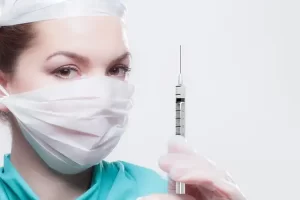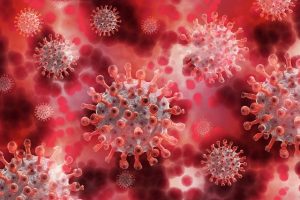Bacterial infection is more terrible than Cancer Recurrence and Metastasis
- Mifepristone: A Safe and Effective Abortion Option Amidst Controversy
- Asbestos Detected in Buildings Damaged in Ukraine: Analyzed by Japanese Company
- New Ocrevus Subcutaneous Injection Therapy Shows Promising Results in Multiple Sclerosis Treatmen
- Dutch Man Infected with COVID-19 for 613 Days Dies: Accumulating Over 50 Virus Mutations
- Engineered Soybeans with Pig Protein: A Promising Alternative or Pandora’s Dish?
- Severe Fever with Thrombocytopenia Syndrome (SFTS): A Tick-Borne Threat with High Mortality
Bacterial infection in cancer patients is more terrible than recurrence and metastasis!
Bacterial infection in cancer patients is more terrible than recurrence and metastasis! Cancer patients and their families are usually afraid of recurrence and metastasis of cancer, but cancer infection is also a very scary thing.

In an analysis of the cause of death of cancer patients, it was written that after an autopsy of 816 dead patients with malignant tumors at MD Anderson Cancer Center and Cancer Institute found:
“Infection is the main cause of death in patients with malignant tumors. 47% of the deaths are due to infection. The second cause of death is organ failure, accounting for 25%, which is about half of infections.”
Take a closer look, it’s okay. This is a 1975 study. The cases in the study are all cases 45-50 years ago.
The editor hurriedly went to find other research data and was shocked, so he found an analysis of the cause of death of 329 emergency tumor patients:
The result of the analysis is that infection, respiratory failure, shock, hemorrhage and heart disease are common causes of death, and the former two account for 36.2% and 32.5% of the total deaths respectively.
Although the proportion of deaths due to infection among emergency cancer patients has decreased, it still occupies the first cause of death.
Cancer infection, don’t you still pay attention to it?
▌Why are cancer patients infected?
The first is because the patient’s body immunity is low.
There are three reasons for low immunity: one is that cancer patients are generally older, and the immunity is not better than when they were young; the other is that cancer consumes the patient’s body to a certain extent; the third and most important point is that chemotherapy drugs It will reduce the number of “guard” white blood cells in the human body, leading to a weakened immunity of the patient.
Secondly, wounds are prone to appear in cancer treatment, which opens the door to the invasion of bacteria and viruses. For example, surgical incisions, injection needle ports, the entrance of the body tube and even skin cracks caused by drugs.
In the end, it is because of the hospital itself. A hospital is a place where all kinds of patients gather, and it is also a place where all kinds of germs gather. Although the hospitals have corresponding disinfection behaviors, the chance of cancer patients being exposed to germs in the hospital has increased.
▌What are the symptoms of being infected?
The first symptom of infection is usually fever. Therefore, cancer patients should pay attention to checking their body temperature with a thermometer during treatment. Once they have a fever, they should contact the doctor immediately and do not take any anti-fever medicines by themselves.
Other symptoms of infection are also important, such as chills or sweating, coughing, shortness of breath, nasal congestion, diarrhea, white spots on the tongue or mouth, pain in the mouth/throat/gums, pain in the sinuses/head/ears, and burning pain when urinating /Turbid urine or hematuria, as well as any warmth, swelling or redness of the skin.
There are many symptoms, but we must pay attention to them, because infections can be treated.
If the infection becomes more life-threatening because it is not discovered in time, it is really sad.
▌In the face of infection, how can we prevent it?
In the face of infection, we must first prevent it.
The first thing to prevent is to pay attention to hygiene. The mouth, skin, food, injection needles and catheters are all areas that need to be kept hygienic.
1) Oral care is mainly to pay attention to brushing teeth and avoiding irritating food. It is best to use a soft toothbrush to brush your teeth, and you need to change the toothbrush every three months. At the same time, you must learn the correct brushing technique to avoid small wounds caused by brushing your teeth.
Avoiding irritating foods refers to avoiding alcohol, tobacco, garlic, vinegar, crunchy foods, and acidic beverages.
2) Skin care mainly lies in bathing and protecting the skin from damage. When bathing, you need to pay attention to cleaning the sweaty areas; do not share bath towels with other family members; use soft bath towels to gently wipe the skin; after the skin is completely dry, use lotions and moisturizers to keep the skin moisturized to prevent dryness and cracking.
To avoid skin damage, you need to: handle sharp objects carefully; don’t squeeze or scratch acne and acne; try to avoid manicure and pedicure; wear shoes and not wear shoes.
3) During periods of physical weakness, it is very important to ensure food safety. The purchased ingredients should be fresh and not degenerate; raw food should be separated from cooked food when refrigerating food to avoid infection; the imported food should be clean and hygienic; avoid eating raw food (Including half-raw eggs) and so on.
4) The nursing of injection needles and catheters mainly depends on the nurses. For patients with normal platelets, the intravenous needle is usually pressed slightly harder for 5 minutes after the needle is removed, and for patients with low platelets, the press must be longer. The length of the press is determined by the nurse.
The care of the catheter is more troublesome. First, the dressing needs to be changed within 24 hours after the catheter is placed, and then every seven days after that, the dressing, catheter flush, and heparin cap need to be changed; daily activities should be reduced at the catheter site; water should be prevented from entering the catheter site when bathing.
If you find any redness, swelling, soreness, or seepage near the device, you need to contact a doctor or nurse in time.
The second thing to prevent is to avoid contact with people or organisms that may carry germs
1) Pay attention to avoid kissing and hugging children who are infected with diseases (such as children with flu and chickenpox);
2) Remember to wash your hands after touching various pets, including turtles, fish, birds, cats and dogs. If it is a wild cat or dog, avoid contact;
3) Avoid going to places where no one goes for a long time or places under renovation. If you want to go, it is best to wear a good dust mask to prevent inhalation of mold in the dust;
4) Avoid going to places with high crowds during the flu season. It is best to wear a mask if you want to go. However, masks do not have much protection against the virus, so it is still necessary to avoid direct contact with people who have flu. If you need to shake hands, wash your hands frequently after shaking hands.
The third thing to prevent is the rational use of drugs to prevent infection.
When the patient’s immunity is very weak and the risk of infection is high, prophylactic antibiotics can be used. Both antibacterial and antiviral drugs can be used to prevent infection.
If the immune system is weakened due to the low number of white blood cells, you can also use white blood injection and white blood lifting drugs to help the body produce immune cells and fight infection.
▌I am really infected, what should I do?
Once the cancer patient is confirmed to be infected, there is only one thing to do: go to the hospital to see a doctor. The doctor will decide which antibiotics you use, whether to isolate or not, and how to apply whitening needles and whitening drugs.
The patient himself only needs to listen to the doctor.
The majority of cancer patients’ infections can be cured after active treatment, so it is better to seek medical attention in time, and don’t be too flustered.
(source:internet, reference only)
Disclaimer of medicaltrend.org



